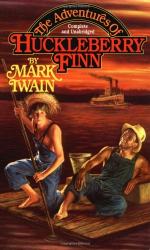|
This section contains 13,760 words (approx. 46 pages at 300 words per page) |

|
SOURCE: Kaye, Frances W. “Race and Reading: The Burden of Huckleberry Finn.” Canadian Review of American Studies 29, no. 1 (1999): 13-48.
In the following essay, Kaye discusses the enduring relevance of Twain's Huckleberry Finn but emphasizes that the novel also glosses over racism in white society by making the reader complicit with the limited worldview presented in the novel.
For the great mass of admiring readers, because Huck and Jim are friends, and because Jim is finally emancipated, the novel's ambiguities are simply dissolved in an overflow of relief and warm fellow-feeling. … Huckleberry Finn continues to be our favorite story about slavery and race because it gives us no more of this reality than we can bear.
(Robinson 1986, 119)
Race and slavery, as almost all readers now acknowledge, are central to Mark Twain's Huckleberry Finn, the great American novel. Twain's episodic, beautiful, ambivalent, cruel, and liberating tale of the Mississippi Valley...
|
This section contains 13,760 words (approx. 46 pages at 300 words per page) |

|


